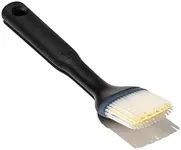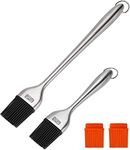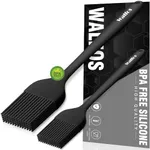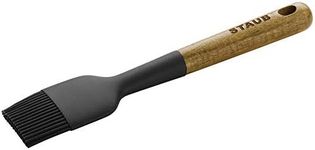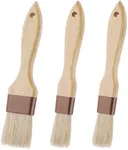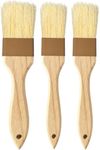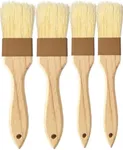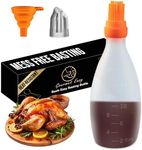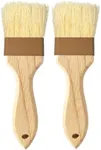Buying Guide for the Best Pastry Brushes
Choosing the right pastry brush can make a significant difference in your baking and cooking experience. A pastry brush is a versatile tool used for spreading butter, oil, glazes, and other liquids over food. When selecting a pastry brush, it's important to consider several key specifications to ensure you get the best fit for your needs. Here are the main factors to consider:Bristle MaterialThe bristle material of a pastry brush is crucial because it affects how well the brush can hold and spread liquids. Common materials include natural bristles (like boar hair) and synthetic bristles (like silicone). Natural bristles are great for holding more liquid and providing a smooth application, but they can be harder to clean and may shed over time. Synthetic bristles are easier to clean, more durable, and often heat-resistant, making them suitable for a variety of tasks. If you need a brush for delicate pastries, natural bristles might be better, while synthetic bristles are ideal for more general use and easier maintenance.
Bristle DensityBristle density refers to how closely packed the bristles are on the brush. A denser brush will hold more liquid and provide a more even application, which is important for tasks like glazing pastries or basting meats. Less dense brushes might be better for lighter applications or when you need more precision. Consider what types of tasks you'll be using the brush for most often to determine the right bristle density for you.
Handle MaterialThe handle material affects the comfort and durability of the pastry brush. Common handle materials include wood, plastic, and metal. Wooden handles offer a traditional feel and good grip but may require more care to prevent cracking or warping. Plastic handles are lightweight, easy to clean, and often dishwasher-safe, making them a convenient choice for everyday use. Metal handles are durable and can provide a sleek, modern look, but they might be heavier and less comfortable for extended use. Choose a handle material that feels comfortable in your hand and suits your cleaning preferences.
Brush SizeThe size of the pastry brush, including both the width of the bristles and the length of the handle, can impact its usability. A wider brush can cover more surface area quickly, making it ideal for larger pastries or basting meats. A smaller brush offers more precision, which is useful for detailed work like decorating or applying egg wash to small pastries. The handle length should be comfortable for you to hold and maneuver. Think about the types of tasks you'll be doing and choose a size that matches your needs.
Heat ResistanceHeat resistance is an important factor if you plan to use the pastry brush for tasks that involve high temperatures, such as basting meats on a grill or applying glazes to hot pastries. Silicone bristles are typically more heat-resistant than natural bristles, making them a better choice for high-heat applications. If you frequently work with hot foods, look for a brush that can withstand the temperatures you'll be working with to ensure safety and durability.
Ease of CleaningEase of cleaning is a practical consideration, especially if you use your pastry brush frequently. Brushes with removable heads or dishwasher-safe materials can save you time and effort. Natural bristle brushes may require more careful hand washing to maintain their condition, while synthetic brushes, particularly those made of silicone, are often easier to clean and more hygienic. Consider how much time you're willing to spend on maintenance and choose a brush that fits your cleaning preferences.
